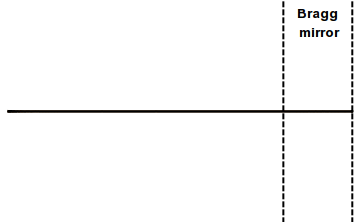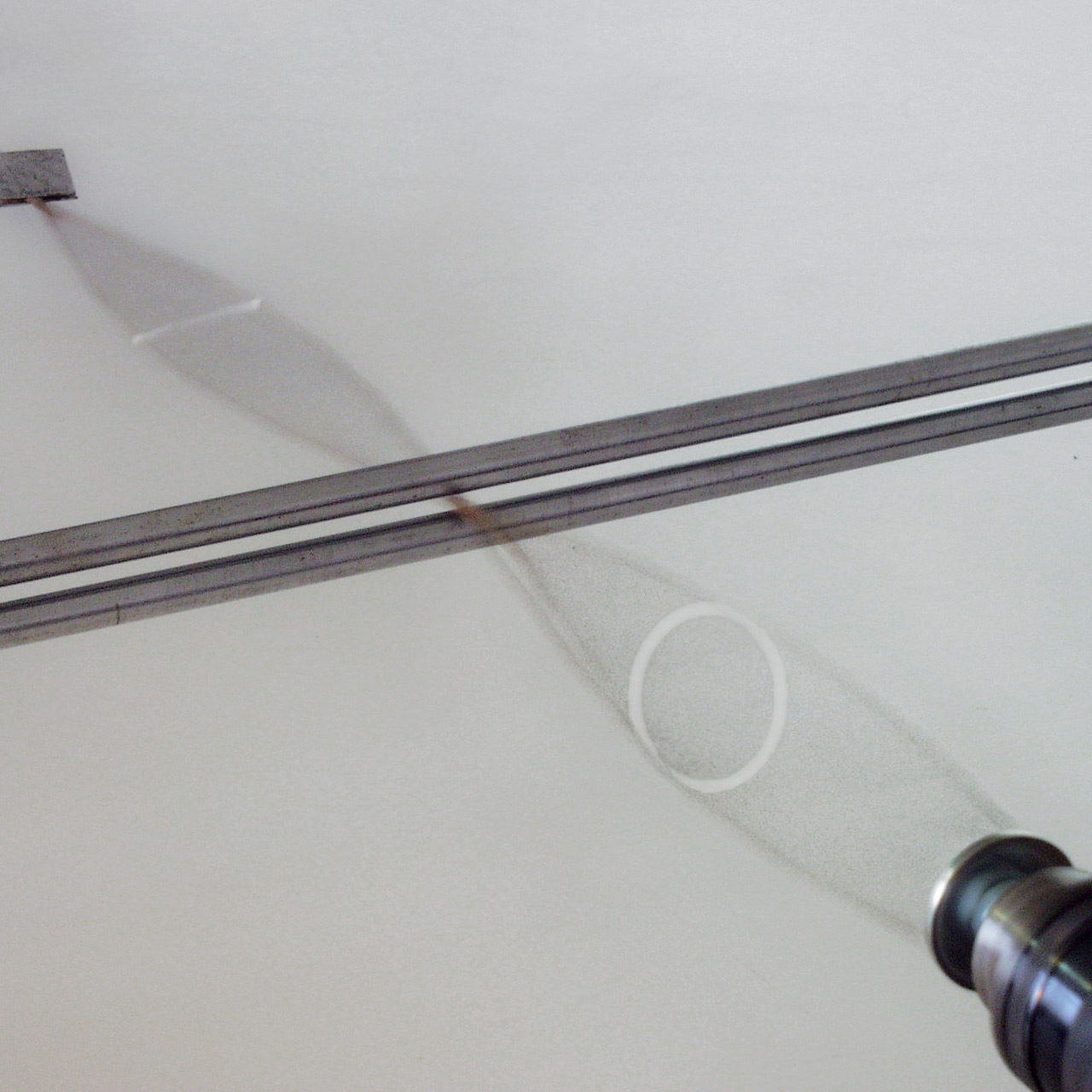|
Distributed Bragg Reflector
A distributed Bragg reflector (DBR) is a reflection (physics), reflector used in Waveguide (optics), waveguides, such as optical fibers. It is a structure formed from multiple layers of alternating materials with varying refractive index, or by periodic variation of some characteristic (such as height) of a dielectric waveguide, resulting in periodic variation in the effective refractive index in the guide. Each layer boundary causes a partial reflection of an optical wave. For waves whose vacuum wavelength is close to four times the optical path length, optical thickness of the layers, the many reflections combine with constructive interference, and the layers act as a high-quality reflector. The range of wavelengths that are reflected is called the photonic stopband. Within this range of wavelengths, light is "forbidden" to propagate in the structure. Reflectivity The DBR's reflectivity, R, for intensity (physics), intensity is approximately given by :R = \left[\frac\right ... [...More Info...] [...Related Items...] OR: [Wikipedia] [Google] [Baidu] |
Bragg
Bragg may refer to: Places *Bragg City, Missouri, United States *Bragg, Texas, a ghost town, United States *Bragg, West Virginia, an unincorporated community, United States *Electoral district of Bragg, a state electoral district in South Australia, Australia *Bragg Islands, Graham Land, Antarctica *Bragg (crater), a crater on the Moon People *Bragg (surname), people with the surname Other uses *Bragg Institute, a neutron and X-ray scattering group in Australia *Bragg Box, a type of traveling museum exhibit invented by Laura Bragg *Bragg Communications, a Canadian cable television provider *Bragg Live Food Products, Inc, a health food company started by Paul Bragg *Bragg's Mill, Ashdon, an English windmill *Bragg House (other), various houses on the National Register of Historic Places *Bragg Memorial Stadium, a football stadium in Tallahassee, Florida Physics *Bragg's law *Distributed Bragg reflector *Fiber Bragg grating See also *Brag (other) *Fort Bragg ( ... [...More Info...] [...Related Items...] OR: [Wikipedia] [Google] [Baidu] |
Distributed Feedback Laser
A distributed-feedback laser (DFB) is a type of laser diode, quantum-cascade laser or optical-fiber laser where the active region of the device contains a periodically structured element or diffraction grating. The structure builds a one-dimensional interference grating (Bragg scattering), and the grating provides optical feedback for the laser. This longitudinal diffraction grating has periodic changes in refractive index that cause reflection back into the cavity. The periodic change can be either in the real part of the refractive index or in the imaginary part (gain or absorption). The strongest grating operates in the first order, where the periodicity is one-half wave, and the light is reflected backwards. DFB lasers tend to be much more stable than Fabry–Perot or DBR lasers and are used frequently when clean single-mode operation is needed, especially in high-speed fiber-optic telecommunications. Semiconductor DFB lasers in the lowest loss window of optical fibers at abo ... [...More Info...] [...Related Items...] OR: [Wikipedia] [Google] [Baidu] |
Structural Colouration
Structural coloration in animals, and a few plants, is the production of colour by microscopically structured surfaces fine enough to interfere with visible light instead of pigments, although some structural coloration occurs in combination with pigments. For example, peacock tail feathers are pigmented brown, but their microscopic structure makes them also reflect blue, turquoise, and green light, and they are often iridescent. Structural coloration was first observed by English scientists Robert Hooke and Isaac Newton, and its principle – wave interference – explained by Thomas Young a century later. Young described iridescence as the result of interference between reflections from two or more surfaces of thin films, combined with refraction as light enters and leaves such films. The geometry then determines that at certain angles, the light reflected from both surfaces interferes constructively, while at other angles, the light interferes destructively. Different colo ... [...More Info...] [...Related Items...] OR: [Wikipedia] [Google] [Baidu] |
Photonic Crystal
A photonic crystal is an optical nanostructure in which the refractive index changes periodically. This affects the propagation of light in the same way that the structure of Crystal structure, natural crystals gives rise to X-ray crystallography, X-ray diffraction and that the atomic lattices (crystal structure) of semiconductors affect their conductivity of electrons. Photonic crystals occur in nature in the form of structural coloration and animal reflectors, and, as artificially produced, promise to be useful in a range of applications. Photonic crystals can be fabricated for one, two, or three dimensions. One-dimensional photonic crystals can be made of thin film layers deposited on each other. Two-dimensional ones can be made by photolithography, or by drilling holes in a suitable substrate. Fabrication methods for three-dimensional ones include drilling under different angles, stacking multiple 2-D layers on top of each other, direct laser writing, or, for example, instig ... [...More Info...] [...Related Items...] OR: [Wikipedia] [Google] [Baidu] |
Polarizer
A polarizer or polariser is an optical filter that lets light waves of a specific polarization pass through while blocking light waves of other polarizations. It can filter a beam of light of undefined or mixed polarization into a beam of well-defined polarization, that is polarized light. The common types of polarizers are linear polarizers and circular polarizers. Polarizers are used in many optical techniques and instruments, and polarizing filters find applications in photography and LCD technology. Polarizers can also be made for other types of electromagnetic waves besides visible light, such as radio waves, microwaves, and X-rays. Linear polarizers ''Linear polarizers'' can be divided into two general categories: absorptive polarizers, where the unwanted polarization states are absorbed by the device, and beam-splitting polarizers, where the unpolarized beam is split into two beams with opposite polarization states. Polarizers which maintain the same axes of polar ... [...More Info...] [...Related Items...] OR: [Wikipedia] [Google] [Baidu] |
Transfer-matrix Method (optics)
The transfer-matrix method is a method used in optics and acoustics to analyze the propagation of electromagnetic or acoustic waves through a stratified medium. This is for example relevant for the design of anti-reflective coatings and dielectric mirrors. The reflection of light from a single interface between two media is described by the Fresnel equations. However, when there are multiple interfaces, such as in the figure, the reflections themselves are also partially transmitted and then partially reflected. Depending on the exact path length, these reflections can interfere destructively or constructively. The overall reflection of a layer structure is the sum of an infinite number of reflections. The transfer-matrix method is based on the fact that, according to Maxwell's equations, there are simple continuity conditions for the electric field across boundaries from one medium to the next. If the field is known at the beginning of a layer, the field at the end of the l ... [...More Info...] [...Related Items...] OR: [Wikipedia] [Google] [Baidu] |
Polarization (waves)
Polarization (also polarisation) is a property applying to transverse waves that specifies the geometrical orientation of the oscillations. In a transverse wave, the direction of the oscillation is perpendicular to the direction of motion of the wave. A simple example of a polarized transverse wave is vibrations traveling along a taut string ''(see image)''; for example, in a musical instrument like a guitar string. Depending on how the string is plucked, the vibrations can be in a vertical direction, horizontal direction, or at any angle perpendicular to the string. In contrast, in longitudinal waves, such as sound waves in a liquid or gas, the displacement of the particles in the oscillation is always in the direction of propagation, so these waves do not exhibit polarization. Transverse waves that exhibit polarization include electromagnetic waves such as light and radio waves, gravitational waves, and transverse sound waves (shear waves) in solids. An electromagnetic wa ... [...More Info...] [...Related Items...] OR: [Wikipedia] [Google] [Baidu] |
DBR TM MODE , airline ICAO code DBR
{{disambig ...
DBR may refer to: * Daniel Bernard Roumain, composer and violinist * DBR Class of diesel locomotive, New Zealand * ''De Bellis Renationis'', renaissance wargaming rules * Design-based research in the learning sciences * Deuterium bromide, chemical formula DBr * Distributed Bragg reflector, used in waveguides * Dowel bar retrofit, highway crack treatment * Drum-Buffer-Rope, in the theory of constraints * ДБР, State Bureau of Investigation (Ukraine) Codes * Bad Doberan, Germany, vehicle license plate * Derby Road (Ipswich) railway station, National Rail code DBR * DutchBird, airline ICAO code DBR * Dobrolet (low-cost airline) Dobrolet LLC (russian: ООО «Добролёт» , translit = OOO Dobrolyot) was a Russian low-cost airline - a subsidiary of Aeroflot - based at Sheremetyevo International Airport. It operated scheduled flights to domestic destinations. Hi ... [...More Info...] [...Related Items...] OR: [Wikipedia] [Google] [Baidu] |
DBR TE MODE , airline ICAO code DBR
{{disambig ...
DBR may refer to: * Daniel Bernard Roumain, composer and violinist * DBR Class of diesel locomotive, New Zealand * ''De Bellis Renationis'', renaissance wargaming rules * Design-based research in the learning sciences * Deuterium bromide, chemical formula DBr * Distributed Bragg reflector, used in waveguides * Dowel bar retrofit, highway crack treatment * Drum-Buffer-Rope, in the theory of constraints * ДБР, State Bureau of Investigation (Ukraine) Codes * Bad Doberan, Germany, vehicle license plate * Derby Road (Ipswich) railway station, National Rail code DBR * DutchBird, airline ICAO code DBR * Dobrolet (low-cost airline) Dobrolet LLC (russian: ООО «Добролёт» , translit = OOO Dobrolyot) was a Russian low-cost airline - a subsidiary of Aeroflot - based at Sheremetyevo International Airport. It operated scheduled flights to domestic destinations. Hi ... [...More Info...] [...Related Items...] OR: [Wikipedia] [Google] [Baidu] |
Free Electron Laser
A free-electron laser (FEL) is a (fourth generation) light source producing extremely brilliant and short pulses of radiation. An FEL functions and behaves in many ways like a laser, but instead of using stimulated emission from atomic or molecular excitations, it employs relativistic electrons as a gain medium. Radiation is generated by a ''bunch'' of electrons passing through a magnetic structure (called undulator or wiggler). In an FEL, this radiation is further amplified as the radiation re-interacts with the electron bunch such that the electrons start to emit coherently, thus allowing an exponential increase in overall radiation intensity. As electron kinetic energy and undulator parameters can be adapted as desired, free-electron lasers are tunable and can be built for a wider frequency range than any other type of laser, currently ranging in wavelength from microwaves, through terahertz radiation and infrared, to the visible spectrum, ultraviolet, and X-ray. The first ... [...More Info...] [...Related Items...] OR: [Wikipedia] [Google] [Baidu] |
Fiber Laser
A fiber laser (or fibre laser in British English) is a laser in which the active gain medium is an optical fiber doped with rare-earth elements such as erbium, ytterbium, neodymium, dysprosium, praseodymium, thulium and holmium. They are related to doped fiber amplifiers, which provide light amplification without lasing. Fiber nonlinearities, such as stimulated Raman scattering or four-wave mixing can also provide gain and thus serve as gain media for a fiber laser. Advantages and applications An advantage of fiber lasers over other types of lasers is that the laser light is both generated and delivered by an inherently flexible medium, which allows easier delivery to the focusing location and target. This can be important for laser cutting, welding, and folding of metals and polymers. Another advantage is high output power compared to other types of laser. Fiber lasers can have active regions several kilometers long, and so can provide very high optical gain. They can support ... [...More Info...] [...Related Items...] OR: [Wikipedia] [Google] [Baidu] |





